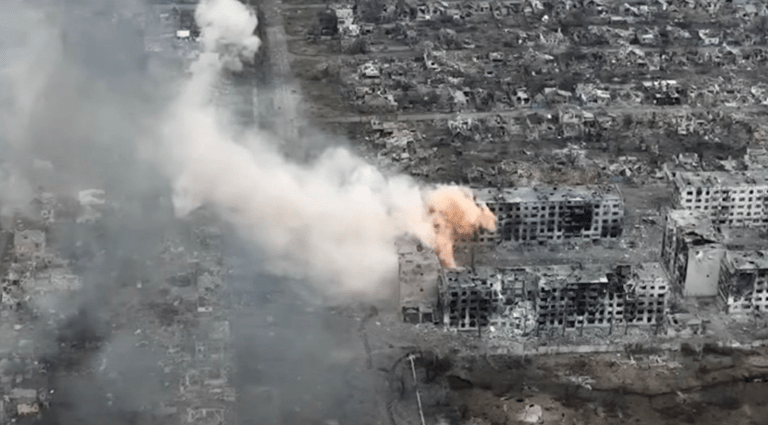Many people are wondering about Yevgeny Prigozhin, the head of the Wagner Group. In the middle of the battle for Bakhmut, Prigozhin started a campaign against Russia’s military leadership, right up to and including the minister of defense, Sergei Shoighu.
He complained about the lack of ammunition for his forces, then about the failure of Russia’s army to protect his flanks as his forces operated inside Bakhmut, then complained about Vladimir Putin, using his nickname in Russia, the Grandfather.
And now he has expanded his attacks saying that the entire Ukraine war was a big mistake and a disaster for Russia.
Prigozhin is not, despite his pretensions, a trained military leader. The battle of Bakhmut was actually led by two highly experienced and tough Russian generals, Sergey Surovikin and Mikhail Mizintsev.
Even so, the Kremlin has been quiet about Prigozhin’s outbursts, and so far he has not been fired or disciplined.
This is strange, particularly since Russians are being thrown in jail for criticizing the military. How can that general crackdown happen while Prigozhin, the bad-mouther-in-chief, is not arrested or punished at all?

(A video of his latest statements can be found here.)
In Russia, politics can be very brutal. Regime critics often wind up dead – they fall out of windows, are poisoned or shot, become suspiciously sudden victims of heart attacks or other maladies. Prigozhin has so far escaped all that.
So what is really going on? Russia has an upcoming presidential election in March 2024. Current President Putin, who is now 70 years old, needs to decide if he will stand in the upcoming election.
There has been an inordinate amount of speculation about Putin’s health problems, and while no one can say for sure, there is physical evidence that supports the argument about his ill health. Quite possibly, Putin may have early-onset Parkinson’s disease. Perhaps Putin will decide not to run in the coming election.
That leaves a number of candidates in the field, including Nikolai Patrushev, the former head of Russia’s security service, the FSB, and now secretary (head) of Russia’s Security Council. Another possible candidate is Dmitry Medvedev, who served as president of Russia from 2008-2012 and is currently deputy head of the Security Council. Both Patrushev and Medvedev are Putin loyalists.
But Prigozhin also is known as a Putin loyalist, although his most recent rants suggest he is no longer. It is possible Prigozhin is positioning himself to run for president, if Putin steps down. He would style himself the successful commander and the peace candidate.
Emulating retired General Dwight Eisenhower, who won the US presidency during the darkest period of the Korean war after campaigning on the promise that he would go to Korea and, presumably, bring an end to the Korean war (which he did by agreeing to split the country into two), Prigozhin could campaign on a platform of going to Ukraine and making a deal with Zelensky.
Prigozhin can only pull off a run for the presidency of Russia if the security apparatus in the country wants him to do so and to be successful It is doubtful they would let him run in an election if the outcome would undermine the security establishment and the military. Indeed, the possibility that Prigozhin might run carries with it considerable angst and doubt in the Russian establishment about the army and its performance in Ukraine.
Would the army stand by and let Prigozhin win such an election? While the Russian army in recent times on only one occasion revolted against state leadership – in the case of the failed coup d’état against Gorbachev – from the army’s point of view an anti-military president poses a much more significant threat.
But Prigozhin may not get as far as actually running for office. Putin could decide to run again, which would short-circuit Prigozhin. Or, Putin could fire Prigozhin or find other ways to silence him.
Putin has yet to act, but surely he was waiting for the Bakhmut battle to end. Now that Russia has won its second major military victory in Ukraine, after Mariupol, there is less need to suffer Prigozhin. It isn’t clear what kind of support Prigozhin may have in Russia, but he is clearly one of Putin’s men, or at least was until recently.

An alternative scenario is that Putin will give Wagner forces and Prigozhin medals for their victory, already hinted at by the Kremlin, and ship Prigozhin off elsewhere, preferably outside of Russia.
Wagner forces are operating in Sudan, Libya, and perhaps still in Syria, so there are places where Russia has interests that can make use of Prigozhin’s talents. Re-deploying Prigozhin would not end any threat he might pose, but it would take him out of the limelight.
Should Prigozhin keep up his running rants against Russia’s leadership, it is hard to see him surviving for very long.
Stephen Bryen is a senior fellow at the Center for Security Policy and the Yorktown Institute. This article was originally published on his Substack, Weapons and Strategy. Asia Times is republishing it with permission.

